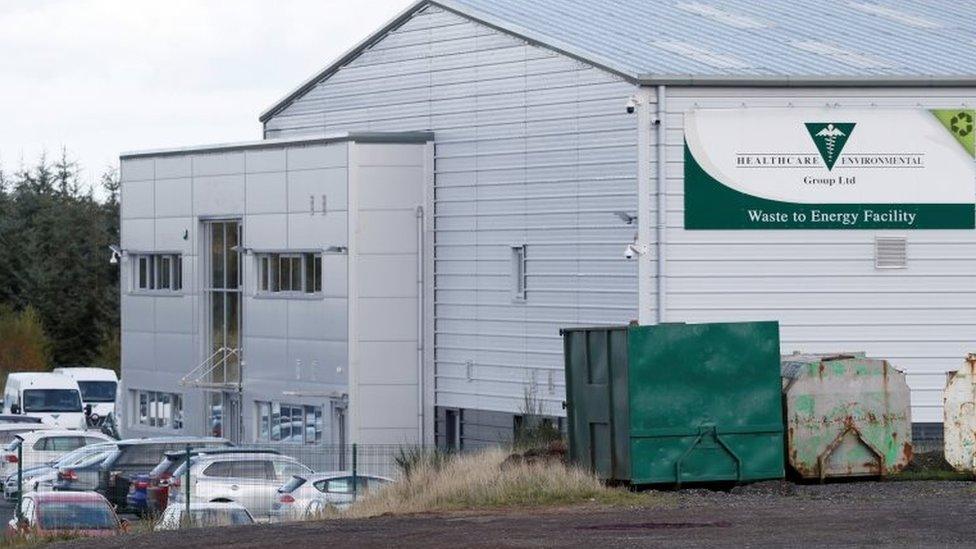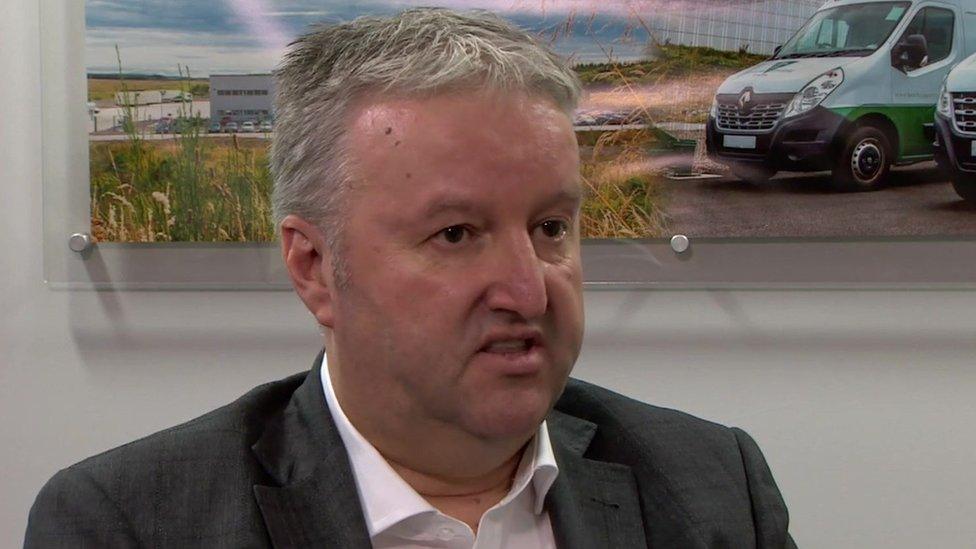HES: From royal approval to collapse
- Published
Health Environmental Services has stopped trading, unable to access its remaining funds, with workers fired.
Scots law on company insolvency has led to an impasse, where it may prove impossible for creditors to place the firm in administration.
The company boss battles on, trying to find a buyer for his firm, and at war with Whitehall.

'Body parts'. The words bring the lure of a gruesome tale of Burke and Hare: a bit Poirot, and a bit Luther. But that was the imagery with which Scottish business ended 2018.
There's a lot more to clinical waste than body parts: the trucks are loaded with discarded dressings, disposable bits of surgical instruments, with 'sharps' (needles, to most of us), and the occasional bit of radioactive isotope.
For 23 years, Healthcare Environmental Services Ltd (HES) based in Shotts, Lanarkshire, grew into one of Britain's main companies relieving the NHS of its waste.
Last year, the Princess Royal opened a £13m re-development of the Shotts plant. The regal signal being sent was that this is not just an ordinary industrial plant: it's a utility of strategic significance, and not only for Scotland.
An incinerator is one of the least popular industrial sites to have in your neighbourhood. The development at Shotts faced local opposition at planning stage, which delayed it and cost HES a lot.
The company reckoned that trying to get approval for further plants in other parts of Britain was too much hassle, so the Shotts plant was built to a scale which could handle much of the waste from England as well.
Meanwhile, it has been trying to get Whitehall to listen to its concerns that there hasn't been enough capacity built, and that it's government's role to address that gap.
Sacked
The route that took HES rapidly from royal approval to its current zombie state is not that clear. There are conflicting accounts.
The first one to establish itself was the Whitehall and NHS England version - that HES had failed to handle the amount of waste it was receiving, that it was breaching its safe storage limits, and that the fall-out was so significant that a Cobra meeting was called.
That's usually reserved for a terrorist incident, but is also a useful way of signalling to the public that the government believes it has a crisis on its hands.
Much of that is hotly disputed by HES boss Garry Pettigrew. But what matters most to 350 staff, including 160 in Scotland, is that they received a letter just after Christmas, saying their jobs were gone.
Mr Pettigrew wrote that if they wanted December pay and their holiday entitlement, as well as redundancy pay, they should contact the Insolvency Service, run from Whitehall.

Garry Pettigrew has claimed his company had been "vilified for providing an excellent service"
Having lost all patience with the civil servants, including a robust personality clash with an official in the Cabinet Office, the HES boss reckons: if they're so smart, they can handle the consequences of (as he sees it) trying to close him down.
While Healthcare Environmental Services Ltd ceased trading, his letter was sent on headed notepaper for a different company, Healthcare Environmental Group, which is described as "dormant". It may be a side issue, but, who and what, exactly, was sacking them?
HES has been unable to pay its bills since 4 December, when its bank, HSBC, froze £300,000 owed to suppliers. Mr Pettigrew spent much of last month racing to find a buyer for the firm, so that it could unlock the funds with which to meet his payroll costs.
By Christmas and pay day, that effort had failed. Mr Pettigrew's claim - impossible to prove, as are many of his allegations - is that dark forces amassed against him in London were telling possible buyers not to bother, until his company had been forced into administration.
His dogged, never-say-die approach to business means that he is refusing to contemplate administration, even though HES doesn't look all that solvent. Gerry Pettigrew still wants to find a buyer.
Messy, smelly, risky
When a company gets to the position HES has reached, creditors could go to court and ask it to hand the company over to administrators. But that only works in Scotland if there is an insolvency practitioner lined up to take on the business. I've learned that some have been sounded out, but none seems willing to take on the business.
They do this if there is insufficient funding to pay their own bills, or if there is a risk of being left with a messy, smelly, risky clean-up. This is most often an environmental risk that could see the administrators lumbered with a lot of cleaning up of toxic nasties and, potentially, of their corporate reputations.
A recent judgement in the Court of Session ruled that environmental clean-up should take priority over every other creditor and expense. That left insolvency experts alarmed at the implications, not least for getting their own fees paid.
There's a way round this if the company is registered in England. An English court would appoint The Official Receiver, a legal entity within the Insolvency Service, that takes on the risks of a failed company, backed by the UK government. That person then contracts with an insolvency practitioner to handle the company's winding down.
That's what happened with the collapse of Carillion last year. The vast contractor for building and running government services was too big and complex for one firm to take on, so the Official Receiver did so, and handed the work to PwC while retaining much of the risk.
However, HES is not an English-registered company, so that legal route is not one creditors could take. Hence, the HES impasse - more than 400 people out of work, without redundancy pay, a firm that has ceased trading but not gone bust, and a backlog of many tonnes of clinical waste
Piling up
Where do the sacked workers stand now? Some of them, we're told, in a food bank queue.
They are entitled to arrears of pay and holiday pay and some redundancy funds linked to the number of years worked for the company.
At least some of that should come from a company that's collapsed. If there aren't funds for that, it comes from the Insolvency Service, and the taxpayer.
Because HES is not in administration or liquidation, this is no normal case. But the Redundancy Payments Service can pay out, and then going after the company for the cost of doing so. It now needs co-operation from Mr Pettigrew in handing over information about his payroll.
And what happens to all those body parts? The backlog has to be handled, and they keep piling up. There is a temporary contract in Scotland and others south of the border, for another company to collect and store waste.
But Garry Pettigrew claims it is not being done safely, with the licences required. The Scottish government counters this, saying it's being done correctly.
He also cites reports in the Health Service Journal that the replacement service is being done at very much higher cost than he was charging.
A further complication is that the Health Service Journal is reporting that one of HES's main rivals, based in the US, which stands to gain the contracts that HES has lost, is being sued by NHS England for over-charging on other contracts.
Mr Pettigrew wants a public inquiry. He's unlikely to get one. But there's a lot of clearing up to do before this is over.